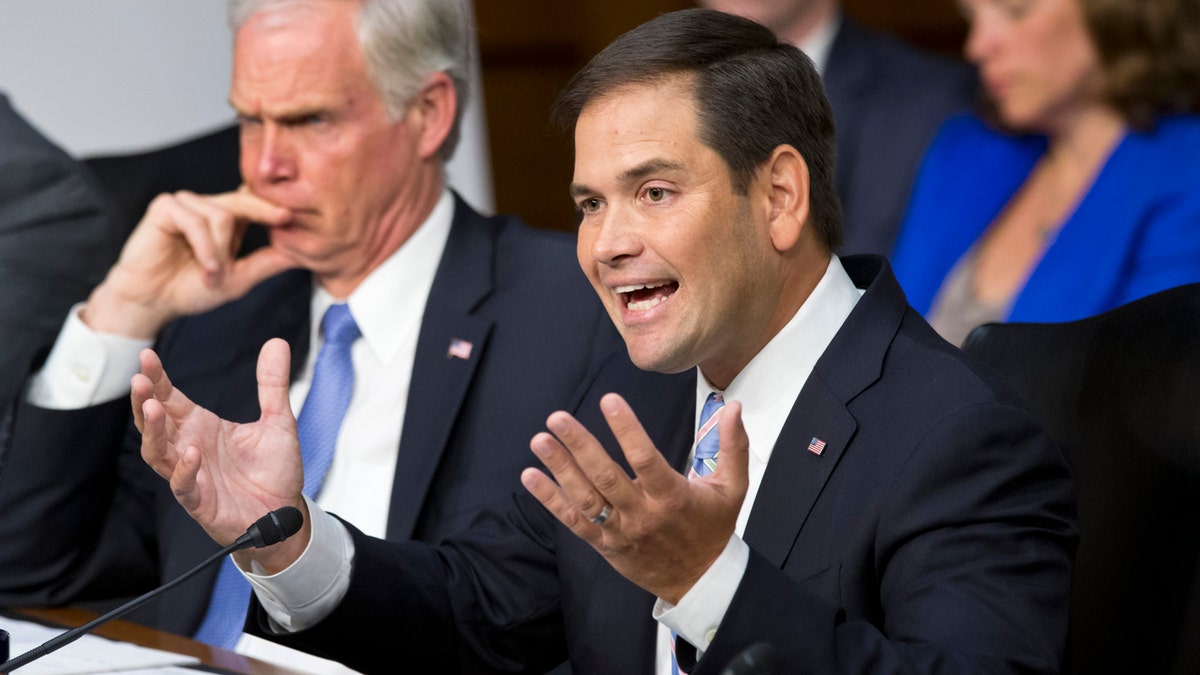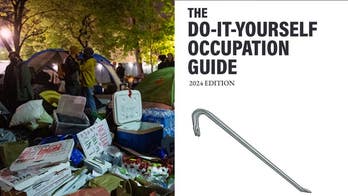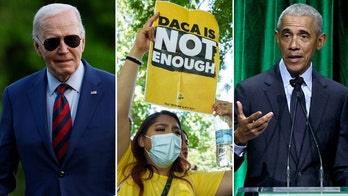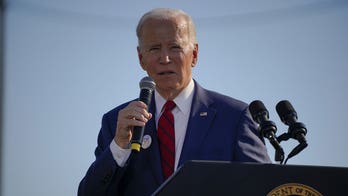
Senate Foreign Relations Committee member Sen. Marco Rubio, R-Fla., joined by fellow committee members, Sen. Ron Johnson, R-Wis., center, and Sen. Jeff Flake, R-Ariz., questions Secretary of State John Kerry during committee's hearing on President Barack Obama's request for congressional authorization for military intervention in Syria, a response to last month's alleged sarin gas attack in the Syrian civil war, Tuesday, Sept. 3, 2013, on Capitol Hill in Washington. (AP Photo/J. Scott Applewhite)
At the Senate Foreign Relations Committee hearing on a U.S. military strike against Syria, Sen. Marco Rubio noted that more than two years ago he had urged for intervention to help rebels topple the president, Bashar Assad.
"When America ignores these problems, these problems don't ignore us," Rubio told senior administration officials at the Tuesday hearing. "Yes, this is a horrible incident where perhaps 1,000 people died, but before this incident 100,000 people had died ... and nothing happened."
Now, as President Obama and several of his top administration officials seek to build support in Congress and the American public for limited military action in Syria after what they say is irrefutable proof that the Assad regime was involved in a chemical attack on more than 1,000 people on its land, Rubio is expressing reservations.
“Because the President failed to act in the right way at the right time,” Rubio wrote on his website, “we are now left with no good options. Failing to act would further embolden Assad and his Iranian sponsors, leaving the impression that America is feckless and impotent. And a limited attack would do nothing to change the dynamics of the conflict, but could trigger a broader and even more dangerous conflict in the region.”
Rubio’s misgivings over what to do about Syria underscore a larger dilemma on the part of Republicans as they look to future elections and their own political careers.
“It. . .shows the difficult line [2016] GOP presidential contenders like Rubio must balance in trying to project a sense of American military might without turning off conservatives skeptical about following Obama’s lead on a war,” said an analysis in Politico.com
On Tuesday, the Senate Foreign Relations Committee's leaders drafted a resolution that would permit Obama to order a "limited and tailored" military mission against Syria, as long as it doesn't exceed 90 days and involves no American troops on the ground for combat operations.
Rubio’s fellow Republican in Congress, Sen. Ted Cruz of Texas, has said he is not yet convinced that it is incumbent upon the United States to act against the Assad regime. Cruz said, in essence, that the United States cannot act as the world’s policeman.
“We certainly don’t have a dog in the fight,” Cruz said, according to TheBlaze.com. “We should be focused on defending the United States of America. That’s why young men and women sign up to join the military, not to, as you know, serve as Al Qaeda’s air force.”
In a separate comment, made in a widely distributed statement, Cruz added: “To date I have heard a great deal from the administration about punishing Bashir al-Assad for violating an ‘international norm’ through the use of chemical weapons, and that this is why we must act against him. Abstract notions about international norms should never displace U.S. sovereignty to act, or refuse to act, for our national security.”
But Rubio has several times said that the United States does have an obligation to act as the world’s policeman.
“I always start by reminding people that what happens all over the world is our business,” Politico.com noted that Rubio said last year in a speech. “Every aspect of our lives is directly impacted by global events. The security of our cities is connected to the security of small hamlets in Afghanistan, Pakistan, Yemen and Somalia.”
The Politico analysis said Rubio gradually has developed a hawkish approach to foreign policy, even as it counters the approach favored by his key constituency, Tea Party activists who generally do not support spending money on more hot spots around the world.
“What remains to be seen is whether Rubio’s shift in rhetoric is seen as a political pandering to conservatives who are still mad at him over his stance on immigration legislation,” the Politico story said, “or if it’s seen as a thoughtful stand by a senator who has methodically built a foreign policy repertoire.”
The Associated Press contributed to this story.
Follow us on twitter.com/foxnewslatino
Like us at facebook.com/foxnewslatino




